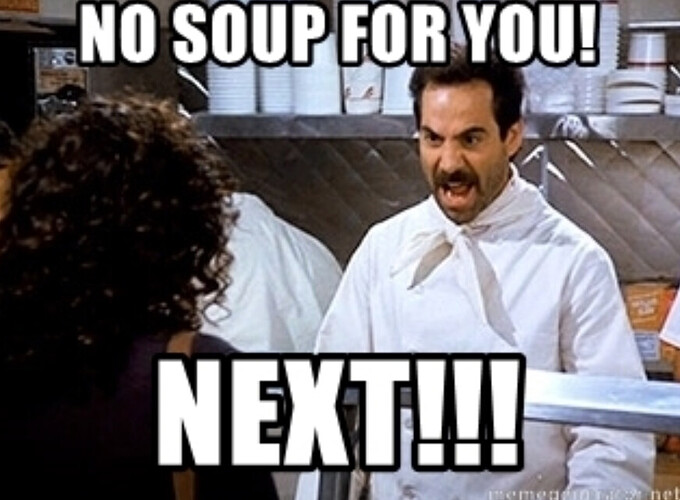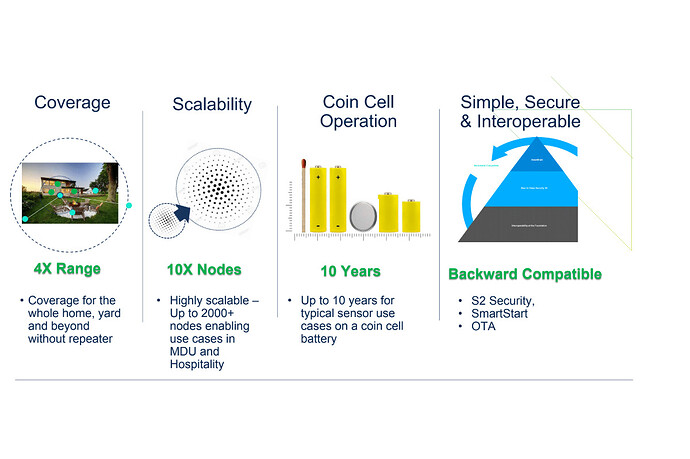All the mesh problems dealing with locks would be a non issue with LR.. Also picture with the range z-wave gate locks..
Do you think this will change how they behave in terms of beaming and being sleepy?
I've had to write RM Apps to loop like 100 times to repeatedly try to lock/unlock my locks with refreshes between each try to get them to behave remotely reliably.
There are so many neat looking 700 series devices... Locks.. Water sensors w/10 year battery... Motion sensors with crazy battery life... Contact sensors w/10 year battery....
Can't buy almost any of them yet though.
Stupid pandemic screwing up manufacturing and distribution... Then Chinese New Year coming up...
All that equals:
No heart icon for you on that one! ![]()
Will this be available on all hubs? Or just C-7?
Just C7.. 700 series chips were built with this in mind, 500 series chips are physically not capable of utilizing the LR frequencies.
What model #’s?
Thanks for asking! How could we ever say no to more range and longer battery life?! ![]() As always, we'll work hard to bring this new feature to any existing and new 700 series devices. There aren't any details available on the technical side or in terms of dates but we'll keep everyone posted and will make sure to share any exciting news here quickly!
As always, we'll work hard to bring this new feature to any existing and new 700 series devices. There aren't any details available on the technical side or in terms of dates but we'll keep everyone posted and will make sure to share any exciting news here quickly!
What am I chiming in on lol? I'm with @agnes.zooz -- not sure on LR, but I suppose, "if we build it, they will come".
Supposedly, anything with a 700 series chip can do LR with a firmware update.
That could make it much easier to connect devices in houses bigger than mine!
You and Agnes are our two favorite vendor peeps...I just wanted to make sure you knew about the LR party that @bcopeland was throwing. ![]()
So, I hate to ask this question... but is the C7 FCC certified for Z-Wave LR?
Reading the stuff from the Z-Wave Alliance, it says that for the United States Z-Wave LR operates at 912/920MHz with DSSS OQPSK modulation. However the current C7 FCC approval appears to only cover operation at 908.4/916MHz with GFSK modulation. Is there a new certification underway?
[Edit: materials from Z-Wave Alliance rather than SiLabs]
In the very first implementation of Z-Wave LR – from Silicon Labs through the 700 Series platform – a proven transmission distance of 1 mile (1.6 KM) direct line of sight has been achieved utilizing +14dBm output power.
So to answer your question +14dBm
Probably easier for you to just go look. Make sure you search for your region - the link is for US.
Look for devices that are zwave plus v2.
https://products.z-wavealliance.org/regions/2/categories
It is sorted by date by default, so typically the 700 series stuff is on the first few pages. Can also go into advanced search and select it to show ONLY zwave plus v2.
Heck we still don't have a firmware update from Zooz to fix the 4-in-1 sensors...
I'm not sure we want +30 dBm transmit anyway - at least not for general use devices. Power usage to increase the transmit strength is not linear, and would likely have a pretty bad effect on battery.
Could be really cool for specialty devices though that are either mains powered or can have big fat battery packs (aka don't need to be small).
All that said, they do have dynamic power management in 700 series devices, so I guess it might be ok for general devices too... As long as it works properly 'all the time' to modulate/reduce the power as needed to get communication, because if it doesn't - zappo to the battery life.
Z-Wave Long Range changes the signal modulation to Direct Sequence Spread Spectrum (DSSS) modulation which is inherently designed to deal with interference. Multiple DSSS devices can all transmit over each other at the same time and on the same channel and still recover their signals using different mathematical codings and statistical signal analysis to recover their signals.




